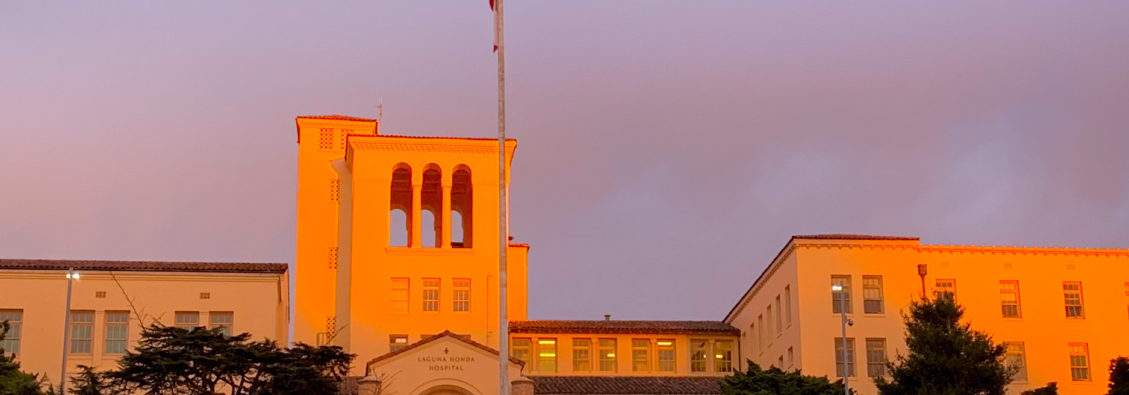Volunteers and the Impact of Coronavirus

By Alistair Shanks
Driving down the winding roadways of the Laguna Honda campus, the first indication that something is amiss is the signs. Laminated signs affixed to A-shaped, folding barricades declare in bold yellow letters against a black background: “BY ORDER OF THE SF HEALTH OFFICER NO VISITORS ARE PERMITTED ON CAMPUS.”
With 780 beds, Laguna Honda Hospital is one of the largest skilled nursing facilities in the country. Our residents are the most at-risk segment of the population for the potentially dire consequences of COVID-19. They are largely elderly with a variety of chronic health conditions. Zen Caregiving Project volunteers serve patients near the end of life with terminal and chronic conditions and designated for comfort care on the Palliative Care Ward, S3. Some have families; many do not. Some have been estranged from family for years, even decades, and are without any social support network whatsoever.
Our volunteers received notice on March 2nd that all non-essential personnel would be barred from the campus. A few days later, families were also prohibited from visiting. In light of the threat posed by COVID-19, it was a necessary and timely intervention. But it has also left residents stranded and more alone. To fill that gap, volunteers have been sending cards and even reaching out via email to some residents. It is a small gesture, but one that will let them know they are not forgotten.
Over time, the volunteers who serve on S3 develop deep and intimate bonds with residents who live there. We are witnesses to their struggles and suffering as well as their joy and wisdom. The open secret about sitting with death and dying and approaching suffering with an undefended heart is that the residents become our teachers. As much as we give to them in the form of time and attention and love, we get back from them many times over in love, appreciation, and insight. This may be unspoken, or it can be explicit.
During a visit with a resident in his room, one volunteer revealed to him that he was a retired ophthalmologist. The resident, an elderly Filipino man, said this:
“Eyes are a mystery.”
“How so?” asked the volunteer.
“You can’t understand eyes until you know what they’ve seen.”
It seems that we are about to see more than we bargained for. Our certainties have been pierced. There are no guarantees. We can only meet this moment with open hearts. I feel myself teetering between a sense of unreality and the relentless reality of it all. And I am grateful for the love and privilege that I do have: a strong community of colleagues and caregivers, a devoted partner, being able to work from home.
Outside it is spring, and trees are blooming all over the city, plum and magnolia. The days are becoming longer, stretching into the evening, a whisper of promise. There is a sense of what Pico Iyer refers to as “radiance and melancholy.” The world is quiet. Almost everything feels frozen in time. There is a stillness, an air of expectancy, a collective breath holding as we wait for the wave to hit, an eerie pregnancy to this moment. It is almost time for the cherry blossoms.
NOTE: On Tuesday, March 31st it was announced that ten staff members of Laguna Honda Hospital and two patients had tested positive for the coronavirus. About 160 staff and 60 residents have been tested for the virus.


